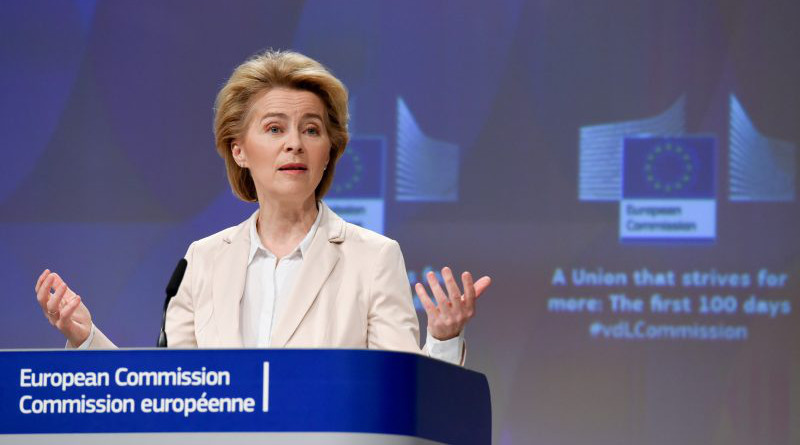Commission Proposes Unprecedented Suspension Of EU’s Fiscal Rules
By EurActiv
By Jorge Valero
(EurActiv) — The European Commission proposed for the first time on Friday (20 March) the activation of the general escape clause that would ‘pause’ the adjustments member states have to do to meet their fiscal targets and allow them to spend “as much as they need”.
Virtually all EU countries are substantially increasing their public spending to counter the spread of the coronavirus COVID-19 and sustain their economy.
“The lockdown of our public life is necessary to contain the virus, but it also slows down severely our economy,” Commission President, Ursula von der Leyen said in a video posted on Twitter on Friday.
With this clause, “national governments can pump [money] into the economy as much as they need,” she added. “We are relaxing the budgetary rules to enable them to do that”
The general escape clause allows structural adjustment under the Stability and Growth Pact’s preventive and corrective arms to be paused in the event of a severe economic downturn in the euro area, or the EU as a whole, as long as fiscal sustainability is not at risk.
Member states will have to give their approval. A Commission spokesperson said that the eurozone finance ministers (the Eurogroup) and the EU leaders had “welcomed” the idea when they discussed it during their teleconferences in recent days. The European Parliament does not have to give its consent.
The activation of the ‘general escape clause’ would represent the full use of the flexibility included in the Pact, as von der Leyen promised on 13 March.
In parallel, the EU executive is also loosening to the maximum the implementation of state aid rules, to ensure that affected workers and sustainable businesses hit by the pandemic receive public support.
The Commission adopted on Thursday the temporary framework to allow member states to provide subsidies in a number of cases. For example, governments could give up to €500,000 to companies without Brussels’ approval.
This subsidy scheme was only used in 2009, in the aftermath of the financial crisis. But while it took three weeks to approve it then, this time, the process has been concluded in three days.
The framework will be in place until December but it could be extended.
Von der Leyen also welcomed the “decisive action” by the European Central Bank on Wednesday, when the bank announced its new €750 billion bond-buying programme to address the fallout of coronavirus.
And she added that “we will do more” to respond to this crisis. One of the ideas being discussed by finance ministers is the joint issuance of debt during this period.
Asked about these temporary eurobonds, or ‘coronabonds’, von der Leyen told German radio Deutschlandfunk early on Friday that “we are looking at everything…everything that helps in this crisis will be used.”
Germany and the Netherlands, longstanding opponents of the euro area’s common eurobonds, remain open to discussing ‘coronabonds’. But they would like to use other options before moving to “the most difficult ones”, an EU diplomat said.
The first stage, the diplomat added, was the full use of the flexibility in the Stability and Growth Pact and state aid rules, as the Commission already proposed.
After that, the official proposed taking full advantage of the European Investment Bank, as the ECB had already deployed almost all of its arsenal.

